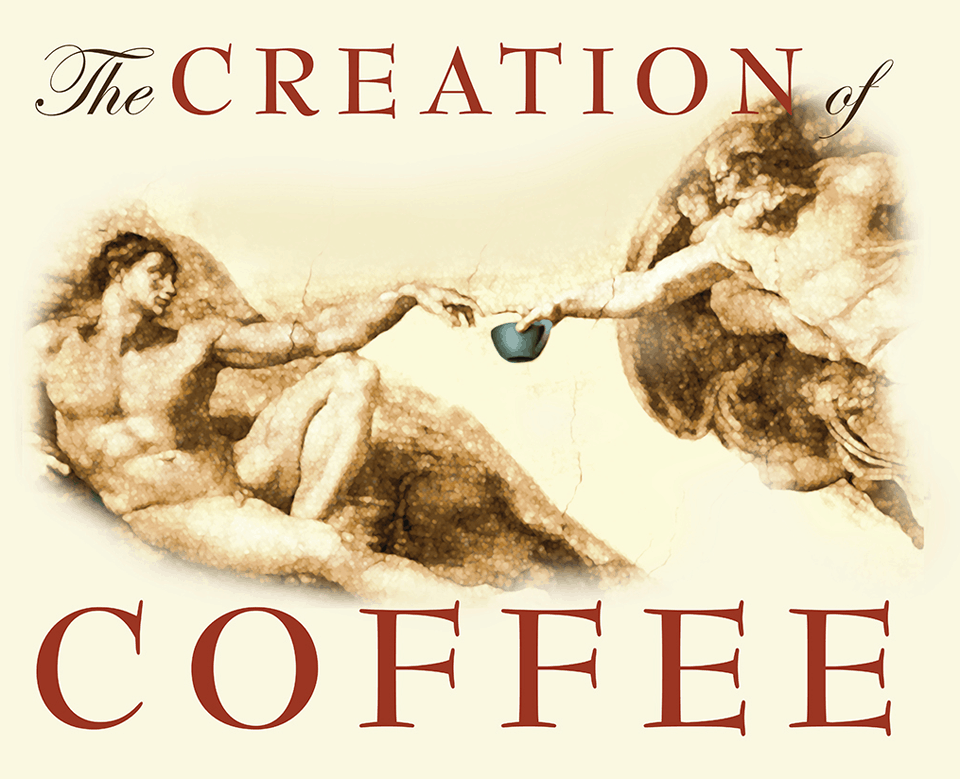
Most ancient religions seem to have a god for every possible thing: Thor is the Norse God of Thunder, Ares is the Greek God of War, Quetzalcoatl is the Aztec God of Wind, Jeff is the Roman God of Biscuits, etc., etc… But as important as it is for our morning routine, why is it you never seem to find a “God of Coffee?”
There is no “official” God of Coffee because coffee is too new! It was not discovered by the world outside of the Ethiopian forests until the 9th Century, long after the establishment of pantheistic religions. Don’t worry, though; I have a few candidates!
Candidates to be The God of Coffee
Waaqa
Caffeina
Gaia
Ek Chua
Saint Drogo
Aurora
Siren
Argus Panoptes
Hestia
Zao Jun
Brigid
Annamurti
Demeter/Ceres
Pamona
Waaqa – Sky God of Ethiopia
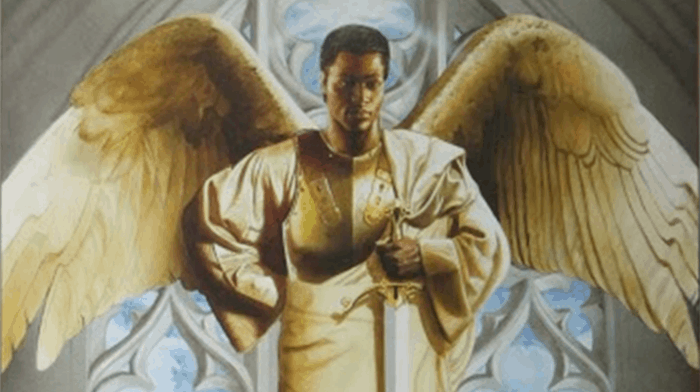
Available for purchase here.
Argument for:
Waaqa, the supreme sky god of the Oromo tribesmen has the leading claim for being crowned The God of Coffee. The Oromo are one of the native populations of Ethiopia and lay claim to the earliest use of coffee. For the Oromo, coffee was a staple food in their diet. Although they did not drink coffee (that would wait until the Sufi monks of 15th century Yemen), they would crush the fruits and seeds of the coffee plant and combine them with animal fat to make a sort of energy ball that could be easily transported and consumed as necessary.
The Oromo have two myths about coffee. It is told that coffee was one of the first things brought to the earth from heaven. Another legend says that Waaqa killed one of his favorites in a rage over his disobedience (another version has him mourning over the death of Horo, the first man). Upon visiting the grave of this person, tears dropped from his eyes to ground. Surprisingly, the next morning, coffee plants emerged from the ground on these spots. The Oromos hold that while all other plants are watered by rain, coffee is watered with the tears of god.
Argument against:
In the Waaqeffanna religion, Waaqa is the one God, creator of all. He is benevolent, omnipotent, and omniscient, much like the Judeo-Christian God. Since he created everything, he, of course, created coffee, but it doesn’t seem altogether right to specify him as the God of Coffee.
Caffeina – Pretend Roman God of Energy

Argument for:
Enter the name Caffeina (or Kaffeina, if you prefer Greek-style gods) into any internet search engine and you will doubtless find references to this recently made-up goddess. The ersatz patroness of energy, stamina, and determination, Caffeina is often portrayed as a beautiful woman emerging from a steaming coffee cup and reaching toward the heavens with an additional cup of the good stuff.
The faux-legend goes like this:
Once, when goddess worshippers were being persecuted, a man named Julianus secretly prayed to the Goddess Caffeina during the night. Unfortunately, tired from his hard day of work, he would often fall asleep before finishing his worship. The man prayed for the Goddess to show him a way to stay awake.
One day, while walking, he observed goats dancing and frolicking in an unusual manner. Asking the herder about their behavior, he was directed toward some shrubs laden with red berries. Deciding to try a few for himself, he felt a rush of energy and began dancing along with the goats. He took the berries home, boiled them, and made the drink we know as coffee. Drinking it every evening allowed him to stay alert during his prayers.
Julianus later was crowned king as Julianus II but after his death, the worship of Goddesses and Caffeina was lost in history.
Variations of this story can be found all over the interwebs
Caffeina’s (sometimes Cafina) claim benefits by her having been specifically created to honor the concepts most closely associated with our favorite beverage. There are more than a few depictions of her floating around online and, after all, a modern myth should be just as valid as an old one. All hail the Dark Mother, Our Lady of the Latte!
Argument against:
Caffeina’s story is historically inaccurate, is cribbed from the legend of Kaldi the Goatherd, and was definitely made up fairly recently. The earliest reference I found was 2006 and the earliest mentions seem to have been made with tongue firmly in cheek:
Very little has been written about Caffeina, arguably the most powerful goddess of the twenty-first century. It could be surmised that Her tradition is oral because Her most devoted followers refuse to sit still long enough to write anything about her down.
Wayback Archive: https://web.archive.org/web/20160115105814/http://www.witchvox.com/va/dt_va.html?a=usny&c=words&id=11799
Come see me in the year 3020 and I might reevaluate my position.
Gaia / Gaea (Roman name: Terra) – Goddess of the Earth

Argument for:
As one of the primordial Greek deities and sort of the Grandmother of the Greek gods and goddesses we are most familiar with, Gaia is the personification of earth and the ancestral mother of all life on it. So obviously, also coffee. She is a good, all-purpose goddess who comes complete with legitimate matriarchal status.
Argument against:
She’s a little “too much.” When you are the mother of the Titans, grandmother of Zeus, and the goddess of the entire earth, it is hard to lay claim to one plant.
Ek Chuah – Mayan God of Cacao / Cocoa
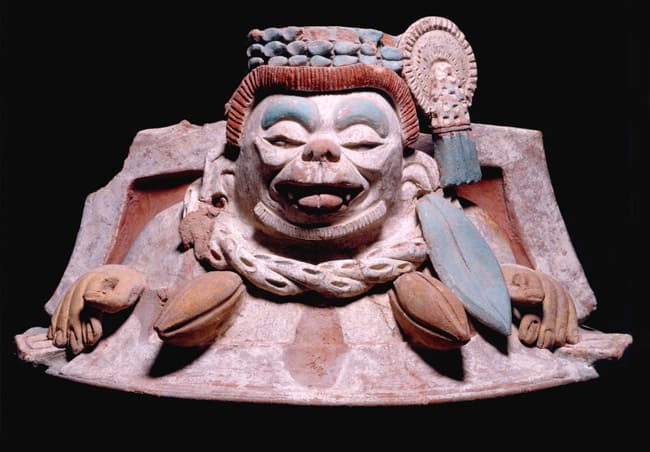
Argument for:
The Maya god of cacao and trade, Ek Chuah has a legitimate chance to become the God of Coffee. Cacao was and is very important to the Mayan people and the beverage made from it was considered to be the drink of the gods. Now that coffee has come to the new world, adding coffee to his portfolio seems like an easy assignment of responsibility.
After all, one dark, bitter beverage deserves another.
Argument against:
Coffee is not actually in Ek’s job description and was not grown in the new world until the 18th century.
Saint Drogo – Patron Saint of Coffee

was also known as Dreux, Drugo, Druon, and (maybe) Druron
Argument for:
The patron saint of coffeehouse owners and workers, Drogo had the power to bi-locate – he was reportedly seen working in the fields at the same time as attending mass. I guess the ability to multi-task (before that was even a thing) would be a useful skill for a barista. Later in life, he subsisted on little more than warm water and barley offered to him through the tiny window in his room next to the church. Surprisingly, brewing barley in hot water gives one a beverage that is almost but not entirely unlike coffee. Maybe it is time for a promotion from sainthood?
Argument against:
Even though he was a real person, he probably never drank a cup of coffee in his life, so that’s a mark against him. Also, he’s not actually a god and is only a saint.
Author’s Note: What an interesting figure! I did a L-O-O-O-N-G post about him here.
Aurora – Roman Goddess of the Dawn
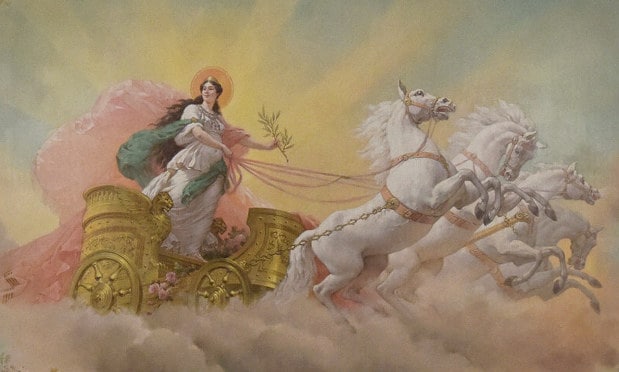
Argument for:
In Roman mythology, Aurora was the sister of both Sol, the sun and Luna, the moon. Her function was to renew herself every morning and fly across the sky, heralding the Sun’s arrival. A goddess that renews herself every morning? Sounds like she’s mainlining double espressos.
Argument against:
There is no real evidence that she has access to a coffee pot or Keurig. Possibly, she is better suited to be a coffee brand mascot or the logo for a coffee shop.
Siren – Mythical Creature
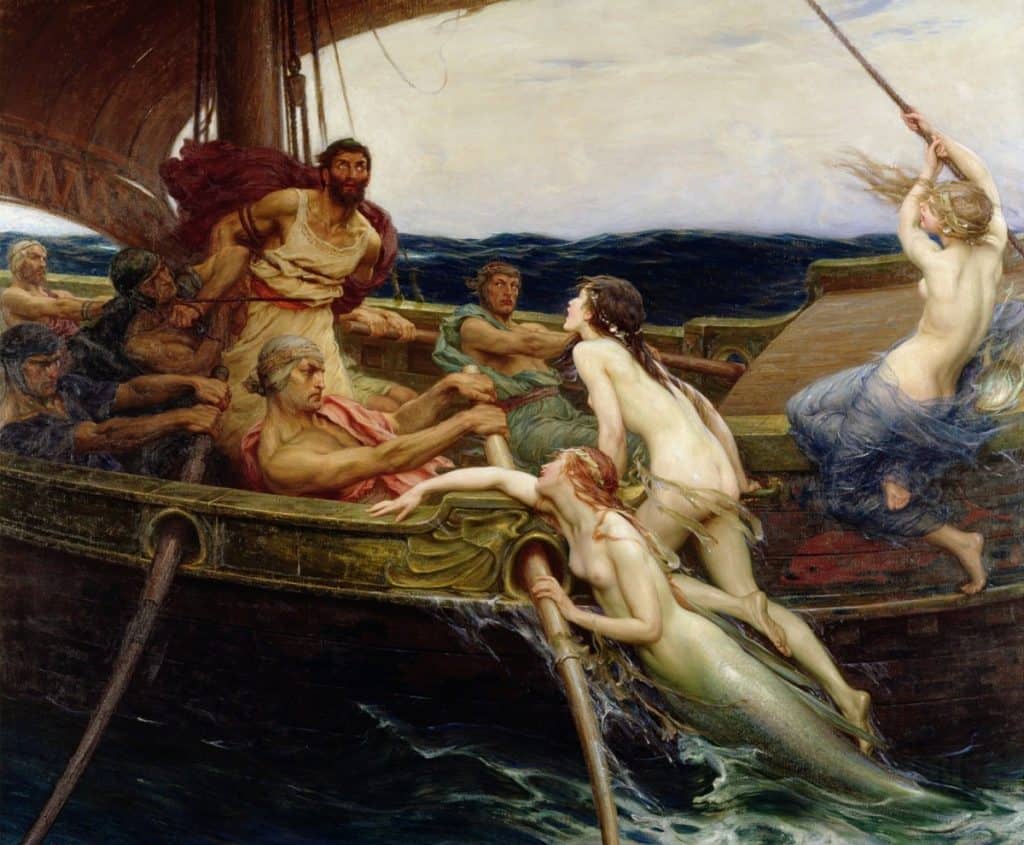
Argument for:
The mythology of Sirens is muddy at best and confusing in the extreme. Part woman and part either bird or fish, we now think of them as a sort of a mermaid with two tails. The Sirens were said to have the power to beguile sailors causing them to crash their ships on rocks. More recently, the image of the Siren has become one of the more recognizable logos in the world, representing a certain large coffee retailer.
Argument against:
A mythical creature, sure, but not a god and with no discernible connection to coffee. Take away the Starbucks logo and you’ve got nothin’.

Argus Panoptes the All-Seeing
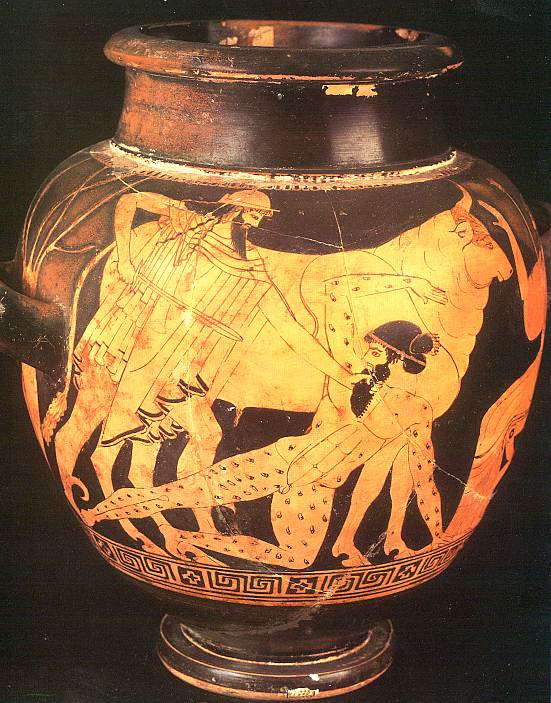
Argument for:
In Greek mythology, Argus Panoptes (Argus the All-seeing) was the personification of alertness. This hundred-eyed giant was charged by Hera with guarding a white heifer. Why, you ask? You see, Hera’s husband, Zeus (who had “affection” for Io), had turned the nymph into a cow to hide her from Hera. It is a long, strange story.
Anyhow, after Argus was slain by Hermes, Hera rewarded his service by placing the image of his many eyes on the tail of the peacock. See? It all makes sense now, doesn’t it.
So, mythological – Check, Alertness – Check. Those are two attributes that definitely coincide with a god of coffee.
Argument against:
Argus’s power was that only some of his eyes would sleep at any one time, leaving at least some awake to “keep an eye out.” A true god of coffee wouldn’t need to do that.
Kitchen Gods
The deities responsible for the health and happiness of the home are almost always focused on the hearth – the place where the fire that keeps everyone warm and cooks all the food lives. Let’s face it: Unless you are one of those “cold brew” types, you want heat of some sort in order to brew your coffee.
Annamurti – Manifestation of Vishnu
Argument for:
Annamurti is one of the manifestations of the Hindu God, Vishnu, serving as the patron deity of kitchens and food. This form of Vishnu has only two arms. In one of his hands he holds a ball of rice and the other payasam or kheer, a sweet pudding made of rice, sugar and milk.
Argument against:
I love rice pudding! And nothing completes dessert better than a hot cup of coffee. Maybe if Annamurti had one of Vishnu’s other arms there would have been room for a demitasse full of the good stuff. I cannot count this as a strong claim for the throne.
Hestia – Greek Goddess of the Hearth
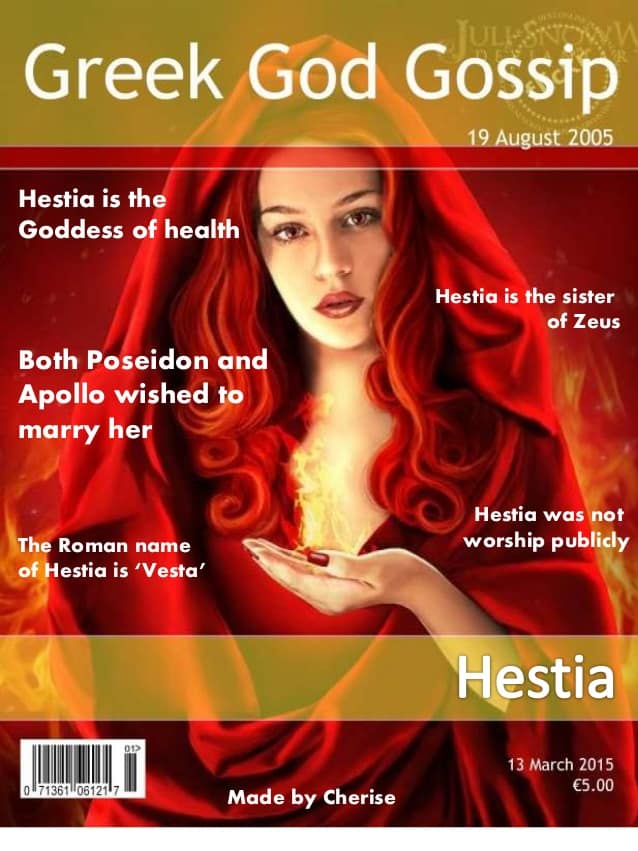
Argument for:
In Greek mythology, Hestia is the virgin goddess of the hearth. She traditionally received the first offering of every sacrifice. The hearth is the heart of the home (hearth/heart – get it?) and it is where the brewing of coffee usually occurs.
Argument against:
Coffee didn’t come to Greece in any great quantity until the 15th century, long after the time of the Olympian gods.
Zao Jun, Zao Shen, or Zhang Lang
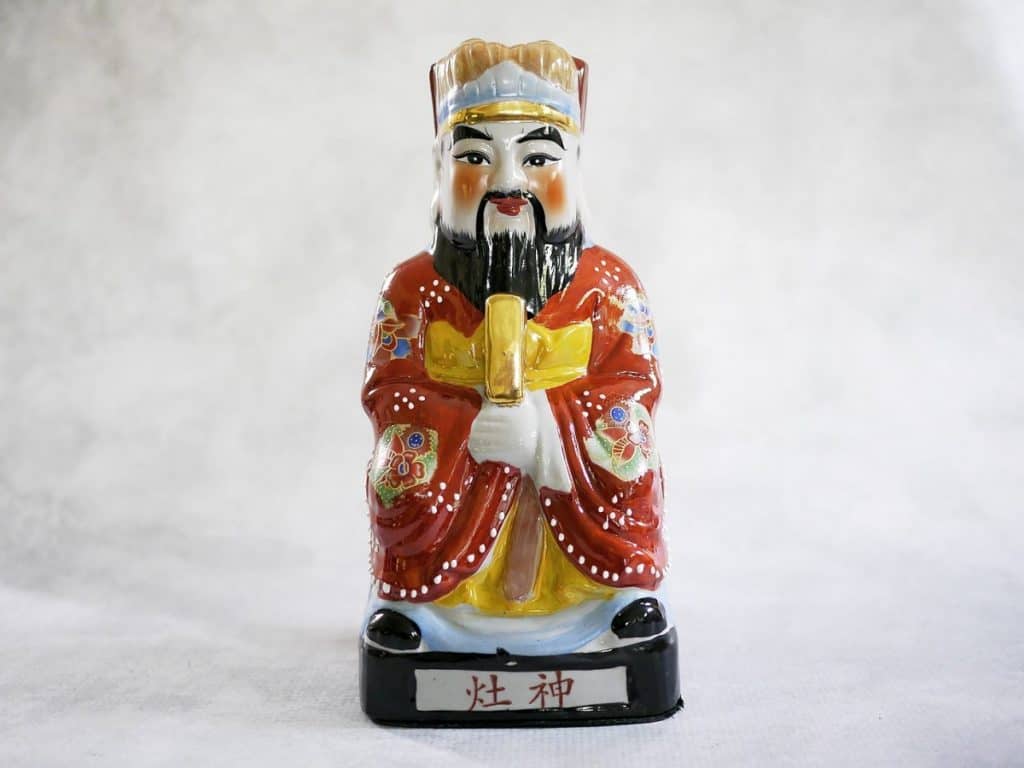
Argument for:
The kitchen god (sometimes the stove god) in Chinese folk religion, mythology, and Taoism, Zao Jun is a human who has been promoted to god status. He reports to heaven just before the Chinese New Year with news of every household over the last year and the Kitchen/coffee combination does make sense.
Argument against:
Nearly every story about him involves him leaving his wife and killing himself. I don’t know about you, but I do not want to think about that every morning.
Brigid – Celtic Goddess of the Hearth
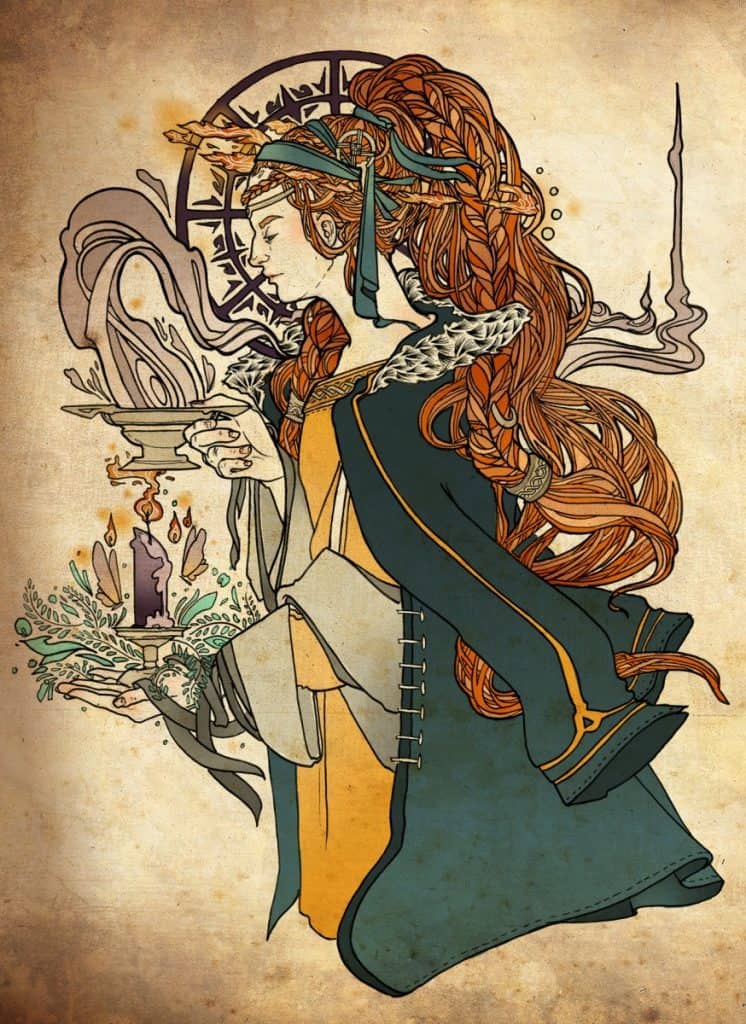
Argument for:
Brigid is a pre-Christian, Irish goddess of many things, including the hearth. See the listing for Hestia for some solid reasoning for a goddess of the hearth to given the title, “Goddess of Coffee.”
Argument against:
As the patroness of poetry, smithing, medicine, arts and crafts, livestock, sacred wells, and the arrival of an early spring, she would seem to be the Swiss Army knife of celtic goddesses. It’s kind of hard to square all of those duties with a cup of joe.
Agricultural gods and goddesses
The gods of the pantheon almost always include one overarching agricultural deity. While coffee is clearly an agricultural product, the agricultural gods and goddesses are usually in charge of ALL the agriculture. And like the monotheistic God of Christianity/Judaism/Islam, if you are the “One God” it’s kind of hard to justify calling you the “God of” any one thing.
Demeter / Ceres – Goddess of the Harvest
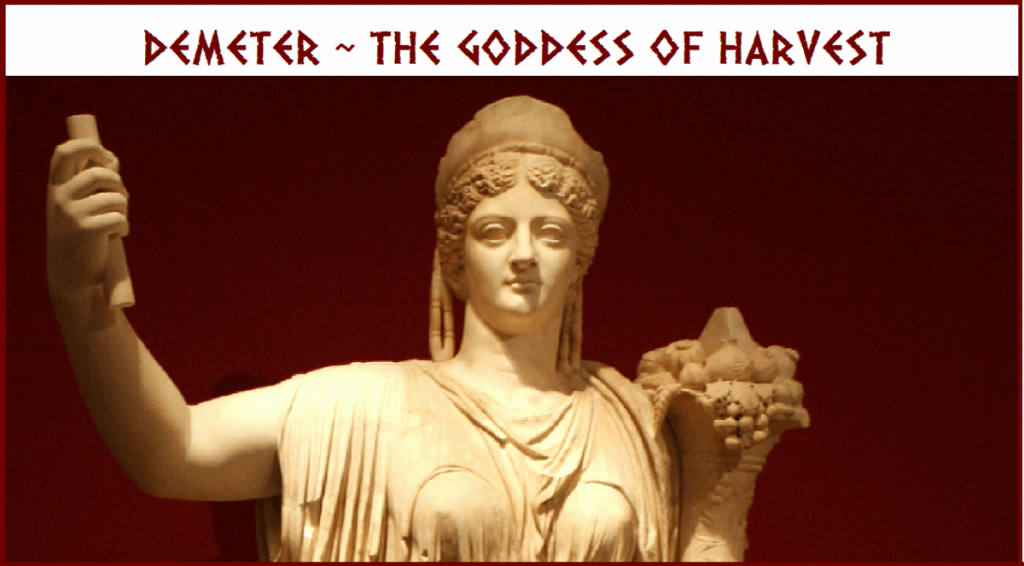
Argument for:
Demeter is the Greek Olympian goddess of the harvest and agriculture, presiding over grains and the fertility of the earth. Ceres is the Roman goddess that is ostensibly the same personage. Coffee is a plant, therefore it comes under her jurisdiction.
Argument against:
While not disagreeing on her credentials as goddess of agriculture, Demeter/Ceres is more associated with grains and cereals (Ceres -> cereal). Goddess of Cheerios? Sure. Goddess of coffee? No way.
Pomona – Goddess of fruit trees

Argument for:
Pomona is one of those unusual Roman goddesses that was not hijacked from the Greek pantheon. The goddess of fruit trees, gardens, and orchards, she watches over, protects, and cares for them in cultivation. Coffee is a cultivated, fruiting shrub or tree and what we think of as a coffee bean is actually the seed of the coffee cherry. The connection would seem to be clear.
Argument against:
Strangely, Pomona is not actually associated with the harvest of fruits, only with the flourishing of the fruit trees. In fact, she is often shown in artistic depictions with a platter of fruit or a cornucopia. So apples and peaches, sure. But we are looking for the god of coffee, which is a harvested, processed commodity, not just the flourishing tree.
Conclusion
So, who is the God of Coffee? The truth is that there just isn’t a perfect choice. Coffee’s “discovery” by Kaldi the Goatherd in the 9th Century is too new to have seeped into any of the classical mythologies and religions. Therefore, there is no Norse God of Coffee and there is no Roman God of Coffee. There is no Greek God of Coffee nor is there a Chinese God of Coffee.
Additionally, although seemingly the natural choice, Waaqa, the Ethiopian deity is slightly problematic due to the monotheistic Waaqeffannaa faith. As mentioned above, when you are the god of creation it is a bit unseemly to also claim to be the god of something specific. Despite all this, I’m going to have to go with Waaqa as The God of Coffee. I just can’t go with the made up Caffeina.
Jeff the God of Biscuits might be a good choice, ‘though. 🤪

Order his stuff here

